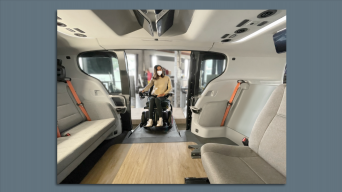Michele Lee, senior public affairs manager at Cruise, works with disability groups to ensure their transportation needs are met. Photo courtesy of Cruise
Widespread availability of autonomous vehicles (AVs) could boost the U.S. economy by hundreds of billions of dollars by bringing more people with disabilities into the workforce, according to a new study, Joann Muller reports.
Why it matters: Transportation is a huge barrier for people with physical and developmental disabilities.
- Public transit services often fail to adequately meet their needs.
By the numbers: Only 21% of Americans with disabilities participated in the labor force in 2021, compared to 67% of those without disabilities.
- And the unemployment rate for people with disabilities was 10% that year — twice that of able-bodied people.
Details: The study, by the National Disability Institute, claims to be the first to look at AVs' potential macroeconomic impact.
- If reliable, affordable self-driving cars were widely available, around 9.2 million more Americans would join the workforce, the researchers found.
- That includes 4.4 million direct jobs for Americans with a disability, plus many more indirect jobs.
- The federal government would see $120.7 billion in benefits, including $93 billion in additional tax revenues and a $28 billion reduction in spending on social safety net programs.
Of note: The study was commissioned by General Motors-owned Cruise, which is developing a robotaxi service and has a vested interest in seeing more AVs on the road.
What to watch: GM is seeking regulatory approval for its driverless Origin robotaxi, which has no steering wheel or pedals.
- It wants the National Highway Traffic Safety Administration to increase the cap on the number of vehicles it can deploy.
- GM and Cruise are designing a version of the taxi to serve people in wheelchairs and those who otherwise need extra assistance.
Source: Read Full Article

